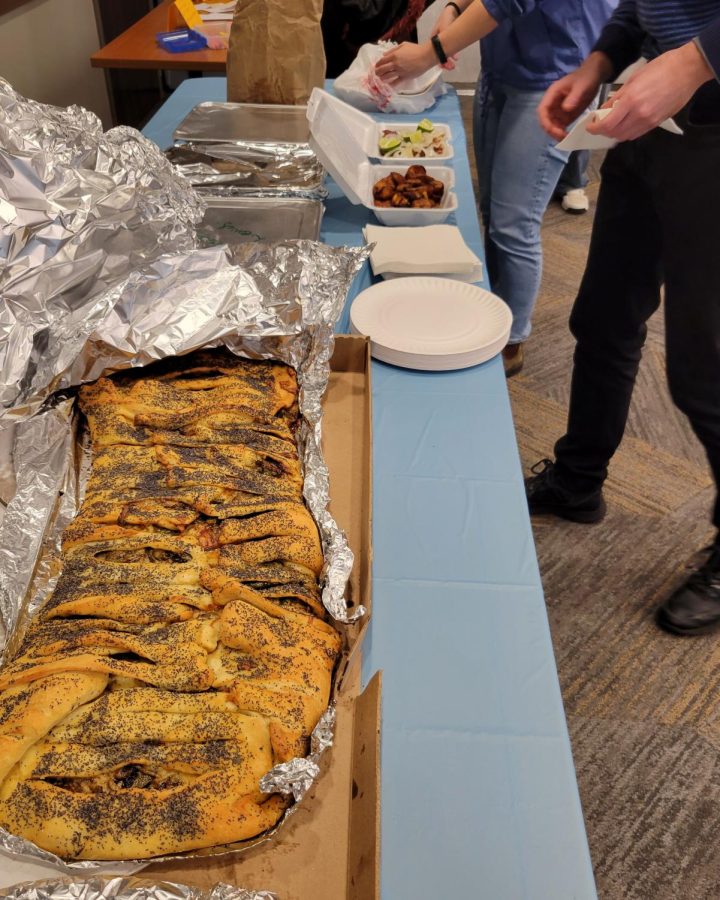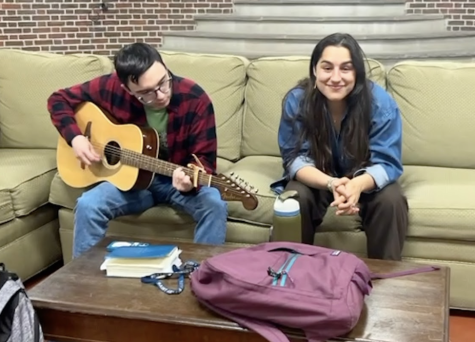Feast of Language celebrated with games, storytelling, poetry
Attendees dined on food from five local restaurants to celebrate Feast of Language.
November 4, 2022
Last Thursday, the Academic Resource Center and Writing Center hosted the Feast of Language in the Jean Center’s Event Space to celebrate multilingualism on campus. The event was funded by a Diversity and Inclusion Innovation Fund grant applied for by Jacob Akey from the class of 2024. Nearly forty students and a handful of faculty came together to have a true feast.
There were dishes from five local restaurants, each representing a language spoken here on campus. The organizers of the Feast took special care to ensure that native speakers of each language operated the restaurants they ordered from. There was stromboli from Luisa’s, representing the college’s Italian speakers, jalebi for Punjabi, Cuban rice and pulled chicken and pork empanadas for Spanish, spanakopita and dolma for Greek, as well as an Arab/Mediterranean selection that included falafel and baba ghanoush. Egg rolls from the North Garden Chinese restaurant also made it to the list, with duck sauce accompanying them.
The event also sought to reveal the often-unrecognized diversity of languages spoken on campus. By the ARC’s reckoning, there are more than 25 languages spoken natively by Saint Anselm College students and faculty. These range from Hebrew to Tagalog.
The Feast of Language included a host of activities. Alongside the smell of fantastic food, multilingual music greeted those who entered into the event space. Attendees wore nametags stating any languages they spoke. There was multilingual poetry translation, which included poetry from Robert Frost and the Spanish poet Octavio Paz, among others. The International Relations club brought Geoguessing for attendees to test their geographical skills.
Feast-goers made a list of words that couldn’t be translated. One inclusion was ‘ennui,’ an originally French word associated with the rich, which the Oxford Dictionary defines as “a feeling of listlessness and dissatisfaction arising from a lack of occupation or excitement.” Another entry was ‘sobremesa,’ a Spanish word roughly meaning ‘post-dinner conversation and relaxation at the table,’ which students and faculty engaged in after the feast.
The attendees told stories about experiences they have had due to their knowledge of a foreign language, or lack thereof. Professor Ann-Maria Contarino, an English professor and coordinator of the Academic Resource Center and Writing center, talked about the time an Italian butcher tried to give her a bad piece of lamb, not realizing she understood every word. Jenne Powers, director of the Academic Resource Center, spoke about how she almost couldn’t buy a tomato in Russia because Russian grocers refused to recognize her pronunciation of the word.
French and German faculty from the Modern Languages & Literature Department represented their respective languages. German professor Justin Mohler brought a German riddle and gave out Haribo gummies.
One senior who attended said, “It was a good time. The food was fantastic. I had no idea so many languages were spoken here.” A sophomore who showed up said, “It was nice to be around people who appreciated language and how language impacts culture. Also, I loved the Cuban rice.” The food was a big hit. Plenty of hungry college students left the feast with their hunger satisfied and their love of language deepened.













